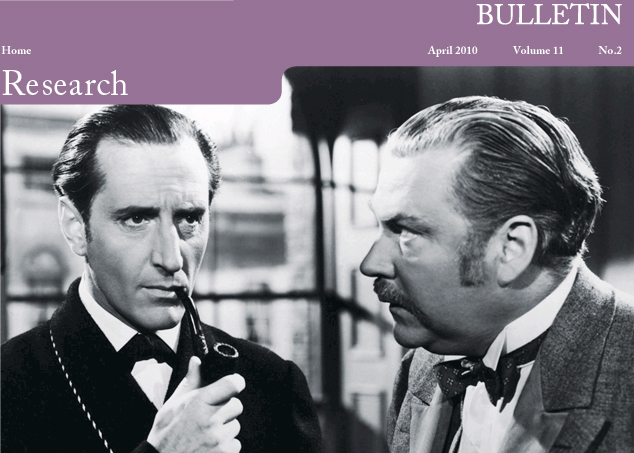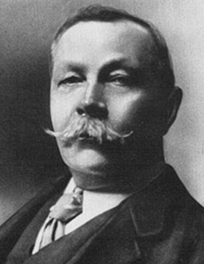

But if Holmes and his trusty sidekick, Dr Watson, continue to capture the imagination then so too does their creator, Sir Arthur Conan Doyle. Biographies of the doctor- turned-author run into their dozens. Now, his life and works are undergoing a fresh, and more scholarly, examination by Professor Douglas Kerr, in the School of English.
He's researching a book on Conan Doyle in relation to the culture of his day, and "how his writing interprets and makes that culture, very much from the middle of it. He is middle brow, middle class, a respectable, bourgeois figure," explains Professor Kerr. "I am looking at a number of cultural themes, science is one, sports is another, and also spiritualism."

| Arthur Conan Doyle |
"He was very physically fit, and this is an important theme in his work because sport, of course, is very ideological, it can express ideas of national character and of masculinity and feminity, it's related to the physical but also to the moral health of nations and communities. It also has to do with questions of fairness and justice, which matter a lot in the Sherlock Holmes tales. Holmes is a kind of artist, but also a sportsman – a boxer – who shows a sporting sense of fair play."
A ferocious letter writer and commentator on political, social, judicial issues, Conan Doyle created, says Professor Kerr," a sense of what certain things mean, what nation, justice, enjoyment mean. So in all of these ways he is very much a central representative figure.
"Conan Doyle's popularity made him a national writer. When you think of Britishness of a certain time he's your man, and he played up to that in a way. He did think of himself as representative of a national character but he played a part in forming that idea of Britishness too."
However, towards the end of his life his growing interest in spiritualism lost him much of the respect he had earned.
"He was widely admired and loved but as he began to write more about spiritualism and fairies, he became much more a figure of fun. He was incredibly reckless in the things that he said, the most famous instance being when he went on record as believing in the authenticity of photographs of fairies manufactured by two bored teenage girls."
The "Cottingley Fairies" are a series of five photographs, taken by two young cousins depicting themselves in various activities with supposed fairies. Conan Doyle was subjected to derision when he wrote an article, published in The Strand magazine in 1920, entitled, 'Fairies photographed – an epoch making event'.
"But, if you take this seriously for a moment it shows that all his life Conan Doyle set his face against materialism," Professor Kerr says. "In late Victorian Britain there was a great masculine worship of money and possessions, and I think this stuff about fairies and spiritualism shows a rather desperate need to believe there was more to the national life than just lucre, power and success."
Conan Doyle still matters, Professor Kerr argues, "because he wrote things people wanted to read, and we're still interested in him and in Sherlock Holmes, in particular. There is no other modern fictional character that has such a vigorous hold on the imagination. There's something about that myth of Holmes and Watson which is very powerful."
In February, Professor Kerr delivered a talk on 'Arthur Conan Doyle and the Consumption Cure', detailing the moment at which he turned away from the medical profession and began writing in earnest. This, and another talk delivered last August on The Lost World will form chapters in his upcoming book.